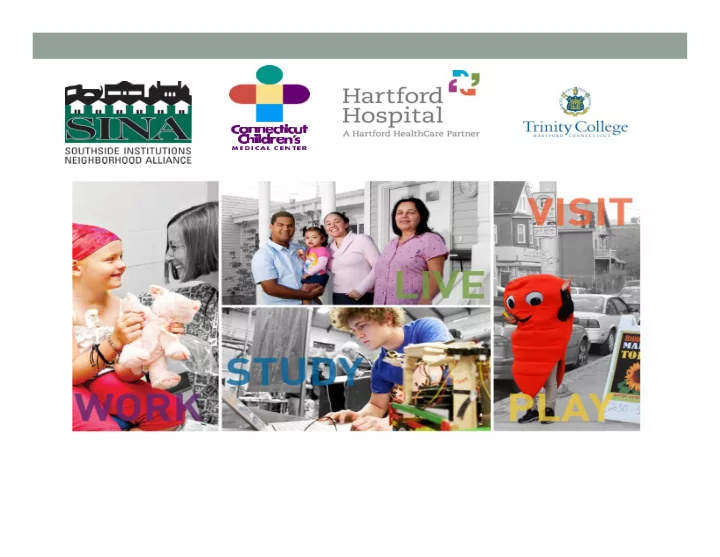

Southside Institutions Neighborhood Alliance (SINA) • SINA is a partnership between three anchor institutions, the Connecticut Children’s Medical Center, Hartford Hospital and Trinity College • Incorporated as a 501 (c) (3) in 1978 • Board composition: three appointed representatives from each institution
SINA Institutions FROG HOLLOW SINA Hartford Hospital Connecticut Children’s Medical Trinity Center College
CCMC Trinity College
Hartford Hospital
SINA • Functions like a nonprofit development corporation: Develops affordable housing and does community organizing With Enhanced Capacity • Funded by institutions • Has a working capital fund • Can develop projects to generate income But no community representation on board ( yet )
SINA Economic Development Initiatives • Employee Mortgage Assistance Program - 1980 • Purchasing Directory - 1983 • Secretarial Training Program – 1986 • Bulkeley Connection: Career advice for high school students provided by institutional employees -1998
SINA Economic Development Initiatives El Mercado - 1990
SINA Economic Development Initiatives Infrastructure improvement program along major corridors and around institutions – 1995
SINA Economic Development Initiatives Neighborhood Jobs Center to connect residents to jobs in the institutions – 1998
The Learning Corridor
The Learning Corridor
Current Work: Homeownership Housing
Homeownership Incentive Program
Property Acquisition
Scholarships
REACH: Neighborhood Service Awards
Revolucion de Nutricion
Community Engagement • Developed in January of 2015 • Strengthen connection between neighbors • Work to encourage residents to adopt leadership roles in community and to represent community to officials and policy makers • Developing close ties to police to address heroin marketplace in neighborhood
Economic Development • Live local • Buy local • Hire local
SINA NEIGHBORHOOD ECONOMIC DEVELOPMENT PLAN Based on a study by Peter Kwass and developed through consultation with neighborhood stakeholders February 2016
Project Goals Increase job opportunities for neighborhood residents by • strengthening linkages between residents and SINA institutions, with attention to both jobs within the institutions and construction jobs related to institutional development projects. Increase entrepreneurial opportunities for neighborhood • residents and businesses, with particular attention to markets created by SINA institutions and their employees, patients, students, and visitors. Contribute to the physical and economic revitalization of the • neighborhood, including but not limited to the Washington Street, Broad Street, and Zion Street corridors, through strategic commercial development and related infrastructure investments.
Planning Process • Gathered Data Through o Primary and secondary data collection o Two community focus groups o Interviews with city agencies, nonprofit service providers, neighborhood-based organizations and other key informants • Stakeholder Meeting with Policy-Makers • Stakeholder Meeting with Community Partners and Residents
Economic Development PROGRAMS • Placement of neighborhood residents in entry-level jobs at the hospitals and college • Support youth career exploration and preparation through engagement with a range of careers at the hospitals and college • Establish a small-scale institutional purchasing program with particular focus on food services, building and grounds services, automotive services, and printing/graphic design.
Economic Development CAMPAIGNS • Launch a restaurant and grocery products market development initiative to promote local enterprises within the institutions and throughout the city • Advocate with the City for public realm improvements on key commercial corridors and gateways • Convene a task force of key stakeholders to develop a neighborhood cultural initiative
Recommend
More recommend